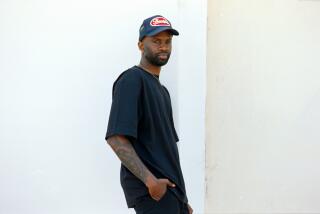He Said, He Said: A Lifetime of Low-Key Male Bonding
Nine of us sit in a circle, talking about the life transition faced by Irv, whose wife died recently after a long illness. He finds himself a widower now, after more than a half-century of marriage.
A 78-year-old dentist, Irv Newmark is tall, white-bearded, balding. He looks like the archetypal grandpa and has had more than his share of woes, including the death of a daughter. He cries easily, which he claims keeps him healthy. What also keeps him healthy is this men’s group, which has been in continuous existence for 30 years.
Since we have no leader and almost no rules, anyone can kick it off. Joel Satzman, 66, a retired orthopedic surgeon, asks: “So how’re you doing?”
Irv shrugs. “There are moments of sadness. You know. Look, I’m doing as well as could be expected.”
Rick Stambul, 55, a lawyer, asks Irv the question we often pose when somebody exposes a wound: “What do you need from us?”
“You’re doing it. Letting me talk and having you listen.” Irv’s eyes well up. “We had our problems, you guys know. What I remember now is the good times. It was so hard for her these last few months. Look, it’s a relief. Her suffering’s finally over.”
Each of us provides Irv with his own brand of solace, but there are no conventional mourners’ platitudes.
“You’re going to have to learn how to be alone,” Rick says.
“I know. I’m already learning.”
Richard Satzman, 61, a lawyer and the person who got me into the group four years ago, says, “Learning how to be alone ... what does that look like?”
“You know,” Irv says, “making sure the laundry gets done, taking care of my own food .... “
“Well, OK,” says Richard. “First thing you’re going to have to learn is how to boil water.”
Irv’s lack of domestic skills is constant fodder for Richard’s jokes, and ribbing each other helps us get through the tough times. But Richard’s comment also points to something deeper, which we often talk about. Irv’s attitudes were shaped by the Depression, Richard’s by women’s liberation. It’s no surprise that they have different ideas of what the male role should be.
The male role, and the changing dynamic between men and women, were central topics in 1972, when consciousness-raising groups sprouted like wildflowers. So several men--mostly lawyers, doctors and therapists--created a forum where they could be open with each other about these and other issues.
Thus our men’s group was formed.
“Male alienation, that was the starting point,” says Herb Eveloff, 72, a psychiatrist. “Men are taught that we have to be strong and keep things inside. Men are ashamed to admit that they even have problems. Women are good at it, but not men. When there’s a problem, men always want to fix it. It’s hard for us just to listen, but that’s what the group is about--listening.”
What generated the group, and what has kept it going, is that it speaks to a deep longing for a place where you can meet with the same bunch of guys, time after time, and say anything, anything at all. A place where you can let out your feelings, and others listen without judgment. For the men who founded the group, as with most people, this need was not necessarily filled by friends, family, or even therapy.
“Look,” says Richard, “in our daily lives we go around keeping up appearances. We present a certain face to the world. We’re fathers, husbands, professionals. Whatever vulnerable stuff lurks inside, we keep it hidden. The group has given us a chance to reveal that part of ourselves.”
The group’s roster has changed little over the years, but a few have left, and others have taken their place. Within the past 10 years, two longtime members died: Mel Albaum, a lawyer, and Al Bauman, a therapist. And Curt Batiste--the one most responsible for starting the group--suffered a devastating stroke. Curt, 68, keeps coming to meetings: a silent, childlike shadow of the brilliant psychiatrist he once was. With two deaths and a stroke, the group has lost three key people. Yet it goes on. There have been only two additions. I’m the newest, and Rick joined 11 years ago.
We meet every other Thursday night, like clockwork. Twice a year we go out of town for a weekend.
On these retreats we don’t beat drums or invoke ancient male rituals. No. We sit in a hotel room, eat at restaurants, sleep in comfortable beds. But like the men around the campfire, we deal with important matters: how the past is prelude to the present, how to live a more conscious life, how to come to grips with our daily reality.
I choose to talk about my older son, who’s 27 now, 34 years younger than I am. A few years ago he graduated from Harvard, and now he’s working for a nonprofit agency, doing community organizing.
“He’s saving the world,” I say sarcastically, “one block at a time.”
Fred Penrose, a psychologist for more than 50 years, says: “What would you like to see him doing?”
I say that I wish he would become an academic. It’s hard for me to hide my disappointment about the choices my son has made.
Joel--bearded, with a soft voice--puts his palms together, tips of his forefingers at his lips.
“This isn’t really about your son, is it?”
I feel the intensity level rise and remind myself that the point is not to look good, but to try to find what’s real.
Everyone has something to say as we all try to get at what my disappointment is really about. When we go through these explorations, it’s like an archeological dig--finding old bones, sifting through layers of memory and feeling, then seeing how the past helps us to make sense of the present.
Finally, after prodding and guidance from the others, I understand that it’s not about my son. It’s about me. It’s about the ambivalence I feel about the choice I made not to become an academic when I was my son’s age.
That’s the way it is with us. When we talk about our concern for our children or the ups and downs with the women in our lives, someone always points out that it’s not about them, it’s about us: how we--as men, husbands and fathers--can understand and deal with our world.
During the weekend, each of us gets a chance to talk about his own concerns. Fred, who’s 80, describes the aging process he’s going through: physical weakness, memory lapses, loss of balance, brittle bones.
“Getting old sucks,” he concludes.
From old age we go to the next step--death. Rick, the youngest in the group, suggests: “What would each of you like to see written on your tombstone?”
Richard, as expected, is funny: “My tombstone? ‘Just once he would have liked to have been called for goal-tending.’” Joel--Richard’s older brother--gives us his: “He was just a cork on the sea of life.”
“Wow,” Rick says to Joel, “that really gets to the Buddha-nature you aspire to, doesn’t it? Accepting whatever comes, floating with life’s changes.”
Richard has a different view. “You’d better hope,” he says to his brother, “that the stonecutter doesn’t put a ‘d’ instead of a ‘c.’”
It takes us a moment, then we realize: “He was just a dork on the sea of life.”
Richard often makes fun of Joel, and sometimes they argue, but we know how much strength they give to each other.
The relationship between Richard and Joel is what the group as a whole is about. We get angry with one another. We poke at one another with sarcasm. But at the end of the day, our love for one another is never in doubt.
We turn our attention to Walter King, a retired lawyer, who is fearful about an angiogram he will undergo the following day. He brought his medical records. Given Walter’s age (73) and poor physical condition, the doctors in the group are concerned that the angiogram could end up a multiple bypass.
Walter--perhaps feeling that this will be his last chance to address the others if things do not go well at the hospital--talks to each of us, telling us what each person means to him. A couple of men in the group have serious illnesses, and none of us is getting any younger. As Walter gives us his benediction, the unspoken thought is: This could be the last men’s group weekend for any one of us.
Four years ago, after a meeting during which we spent most of the evening talking about health issues, Joel said: “I liked this group better when we talked about our love affairs.” When I remind Joel of that now, he says that he was being facetious. He loved the group years ago, and he loves it now.
“The group has gone through all the stages of life,” says Joel. “Like in Asian religions, where you go from disciple to householder, with all the desires of each stage, and finally, at the last stage, you become spiritual. That’s where we’re at now. A great pleasure for me has been to see this group go through the whole rich tapestry of life.”
When Joel says this, I think of Hesse’s Siddhartha, who listens to the river and hears all the sounds of his entire life--the pleasure and pain, the laughter and tears, all of it as a single sound.
Sometimes, when I’m with the group, I hear that sound too: all of life, the joy and sorrow, as if all past years of shared history had merged into a timeless present. Maybe, in the end, after all the questions and advice, after all the laughter, what the group is left with is something beyond words--the simple act of having been together year after year, for practically a lifetime.
That is the sound of the men’s group, and it’s more than enough.
Postscript: Walter went in for an angiogram, and no surgery was needed.
Irv is learning how to boil water.
And in the days after the weekend, Fred made a collage: the heads of nine men floating on a blue, wavy background. He calls it, “Corks and Dorks on the Sea of Life.”
*
Roberto Loiederman is co-author of “The Eagle Mutiny,” a nonfiction book about the only armed shipboard mutiny in American history.


